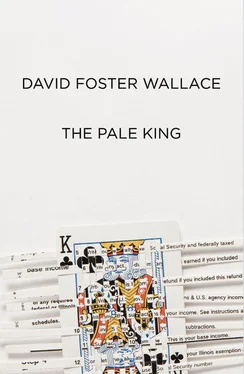David Wallace - The Pale King - An Unfinished Novel
Здесь есть возможность читать онлайн «David Wallace - The Pale King - An Unfinished Novel» весь текст электронной книги совершенно бесплатно (целиком полную версию без сокращений). В некоторых случаях можно слушать аудио, скачать через торрент в формате fb2 и присутствует краткое содержание. Год выпуска: 2011, Издательство: Little, Brown & Company, Жанр: Современная проза, на английском языке. Описание произведения, (предисловие) а так же отзывы посетителей доступны на портале библиотеки ЛибКат.
- Название:The Pale King: An Unfinished Novel
- Автор:
- Издательство:Little, Brown & Company
- Жанр:
- Год:2011
- ISBN:нет данных
- Рейтинг книги:3 / 5. Голосов: 1
-
Избранное:Добавить в избранное
- Отзывы:
-
Ваша оценка:
- 60
- 1
- 2
- 3
- 4
- 5
The Pale King: An Unfinished Novel: краткое содержание, описание и аннотация
Предлагаем к чтению аннотацию, описание, краткое содержание или предисловие (зависит от того, что написал сам автор книги «The Pale King: An Unfinished Novel»). Если вы не нашли необходимую информацию о книге — напишите в комментариях, мы постараемся отыскать её.
The Pale King
The Pale King: An Unfinished Novel — читать онлайн бесплатно полную книгу (весь текст) целиком
Ниже представлен текст книги, разбитый по страницам. Система сохранения места последней прочитанной страницы, позволяет с удобством читать онлайн бесплатно книгу «The Pale King: An Unfinished Novel», без необходимости каждый раз заново искать на чём Вы остановились. Поставьте закладку, и сможете в любой момент перейти на страницу, на которой закончили чтение.
Интервал:
Закладка:
981472509
‘Tate is a moth at the arc lights of power. Pass it on.’
951458221
‘It’s a fascinating question. The background is interesting, if you delve into it. Type of thing. One of the tenets of the incoming administration was the belief that marginal tax rates could be lowered, especially in the top brackets, without causing a catastrophic loss of revenue. This had been an explicit part of the campaign. Platform type of thing. I’m no economist. I know the theory was that lower marginal rates would spur investment and increased productivity, type of thing, and there would be a rising tide that would cause an increase in the tax base that would more than offset the decrease in marginal rates. There is a whole technical theory behind this, though some dismissed this as voodoo science. Type of thing. By late in the first year, sure enough, the regs are different, the top brackets are lowered. It goes on that way. By, say, two years in, though, it’s fair to say the results contradicted the theory. Revenues were down, and these were hard numbers that could not be fudged or massaged. There were also, I believe, very large increases in defense spending, and the federal budget deficit was the greatest in history. In adjusted dollars type of thing. You have to understand that this was all playing out at a far higher level of government than the level we’re working at here. But anyone could understand the budget problems were a real rock-and-hard-place type of thing, since backpedaling and raising marginal rates again was politically unacceptable, ideologically you could say, as was compromising on the military, and gutting social spending any further would make relations with Congress unworkable. Type of thing. All of this one could almost know just from reading the newspaper, if you knew what to look for.’
Q.
‘Yes, but in terms of what we knew here, at our level here in the Service. Some of it was not in the papers. I know the executive branch had several different plans and proposals they were considering, to address this problem. The deficits, the hard place. My sense is that most of these were not appealing. Type of thing. Understand, all this is filtering down from a great height, administratively. The version we got here on the regional level is that someone very high up in the Service’s structure, someone close to what’s known around here as the Three-Personed God, resurrected a policy paper originally written in either 1969 or 1970 by a macroeconomist or systems consultant on the staff of the former Assistant Commissioner for Planning and Research at Triple-Six. The one that resurrected it was, under this account, an Assistant Deputy Commissioner for Systems, which by that time had absorbed the Planning and Research Branch as now a division of Systems in a reorganization, Systems had, type of thing, although that previous Planning and Research AC was also now the DCS.’
Q.
‘Now meaning in terms of when the Spackman Memo was resurrected, which was in or around the fourth quarter of 1981.’
Q.
‘The DCS is part of what’s known as the Three-Personed God, the [inaudible] term for the top triad of Commissioner, Deputy Commissioner for Systems, and Chief Counsel. The three top spots in the Service organization. The national office of the Service is known as Triple-Six because of the address. Type of thing.’
Q.
‘These types of high-level proposals and white papers are generated all the time. Planning and Research has what amounts to think tanks type of thing. This is common knowledge. Full-time teams exclusively tasked to generating long-range studies and proposals. There’s a famous policy paper from a P&R group in the 1960s, type of thing, on the implementation of tax protocols following a nuclear exchange. Called “Fiscal Planning for Chaos,” which became rather a famous term around here, a kind of joke when things became hectic, chaos type of thing. Overall, few of them are made public. From the mid-sixties. Your tax dollar at work type of thing. This one that was resurrected in this context, though, was far less grand or explosive. I don’t know its precise title. Sometimes it’s known as the Spackman Memo or the Spackman Initiative, but I know of no one that knows who the eponymous Spackman was, type of thing, whether he was the author of the policy paper or the P&R official for whom the thing was written. It was generated, after all, in 1969, which was lifetimes ago in the institutional life of the Service. Most of them get filed away, type of thing. Understand, this is a compartmented agency. Many of the procedures and priorities of Triple-Six are simply out of our area. Type of thing. The Initiative’s reorganizations, though, affect us directly, as I’m sure someone has explained. The original paper was said to be several hundred pages in length and very technical, as economics tends to be. Type of thing. But on a general level, the effective principle of the part or parts that came to later light was said to be quite simple, and it — [inaudible] — through routes unknown, it came to the attention of parties at the very highest levels of either the Service or the Treasury Department, and created interest because, in the budgetary impasse of the current executive branch, it appeared to describe a politically more appealing way to ameliorate the rock-and-hard-place of unexpectedly low tax revenues, high defense outlays, and an uncuttable base floor in social spending. At root, type of thing, the paper’s proposal was said to be very simple, and of course the current executive approves of simplicity, arguably because this administration is somewhat of a reaction type of thing, or backlash, against the complex social engineering of the Great Society, which was a very different era for tax policy and administration. But its preference for simple, instinctive arguments is common knowledge. Type of thing. By the way, I can’t help noticing you’re wincing.’
Q.
‘By all means.’
Q.
‘As we understood it, the Spackman paper’s root observation was that increasing the efficiency with which the Service enforced the extant tax code could provably increase net revenues to the US Treasury without any corresponding change in the code or a raising in marginal rates. Type of thing. Meaning it directed attention to Compliance and the tax gap. Should I define the gap, type of thing? Is this already defined by someone else? Are you asking everyone the same type of thing for this? Would the Service prefer that I not go into this?’
Q.
‘I suppose it’s self-evident, type of thing. It’s the difference between total tax revenues lawfully due the US Treasury in a given year and total taxes actually collected by the Service in that year. It is rarely spoken of openly, largely [inaudible]. It is now the bête noir type of thing of the Service’s focus. Though not at the time. It had been estimated, in the Spackman paper, that between six and seven billion dollars lawfully due the US Treasury in 1968 had not been remitted. Spackman’s econometric projections placed the tax-gap figure for 1980 at close to twenty-seven billion, which appeared, by the time of the paper’s resurrection, to be overly optimistic. Excluding appeals and litigation, the measured tax gap for 1980 was actually in excess of thirty-one and a half billion dollars. What was remarkable was that the tax gap’s size had not been much remarked on or made the object of serious attention. I believe this is why it’s rarely spoken of openly, the institutional stupidity of this, type of thing. Or that this is why the Spackman paper never received serious attention, although as I said, policy papers like this are generated by Systems all the time. Institutions can be much less intelligent than the individuals that make them up. Type of thing. There’s also the fact that the Service is concerned to have the taxpaying public see it as nothing but a completely efficient, all-knowing instrument of tax collection — there are complex psychodynamics involved in taxation and the public’s willingness to comply with tax law. For one thing, too much efficiency can be misconstrued as hostility, excessive aggression type of thing, which increases TP hostility and can actually negatively affect the public’s compliance and the Service’s mandate and budget, type of thing. Meaning the whole matter is complex, type of thing, and the psychodynamics are outside our area, and my understanding of it all is quite vague and general, type of thing, though we know that it is a matter of considerable interest and study at Triple-Six. Spackman’s report, the subsection of interest, was resurrected by some person or persons close to the Three-Personed God. There are conflicting versions as to just whom. Type of thing. I’m speaking of a period roughly two and a half years ago.’
Читать дальшеИнтервал:
Закладка:
Похожие книги на «The Pale King: An Unfinished Novel»
Представляем Вашему вниманию похожие книги на «The Pale King: An Unfinished Novel» списком для выбора. Мы отобрали схожую по названию и смыслу литературу в надежде предоставить читателям больше вариантов отыскать новые, интересные, ещё непрочитанные произведения.
Обсуждение, отзывы о книге «The Pale King: An Unfinished Novel» и просто собственные мнения читателей. Оставьте ваши комментарии, напишите, что Вы думаете о произведении, его смысле или главных героях. Укажите что конкретно понравилось, а что нет, и почему Вы так считаете.












